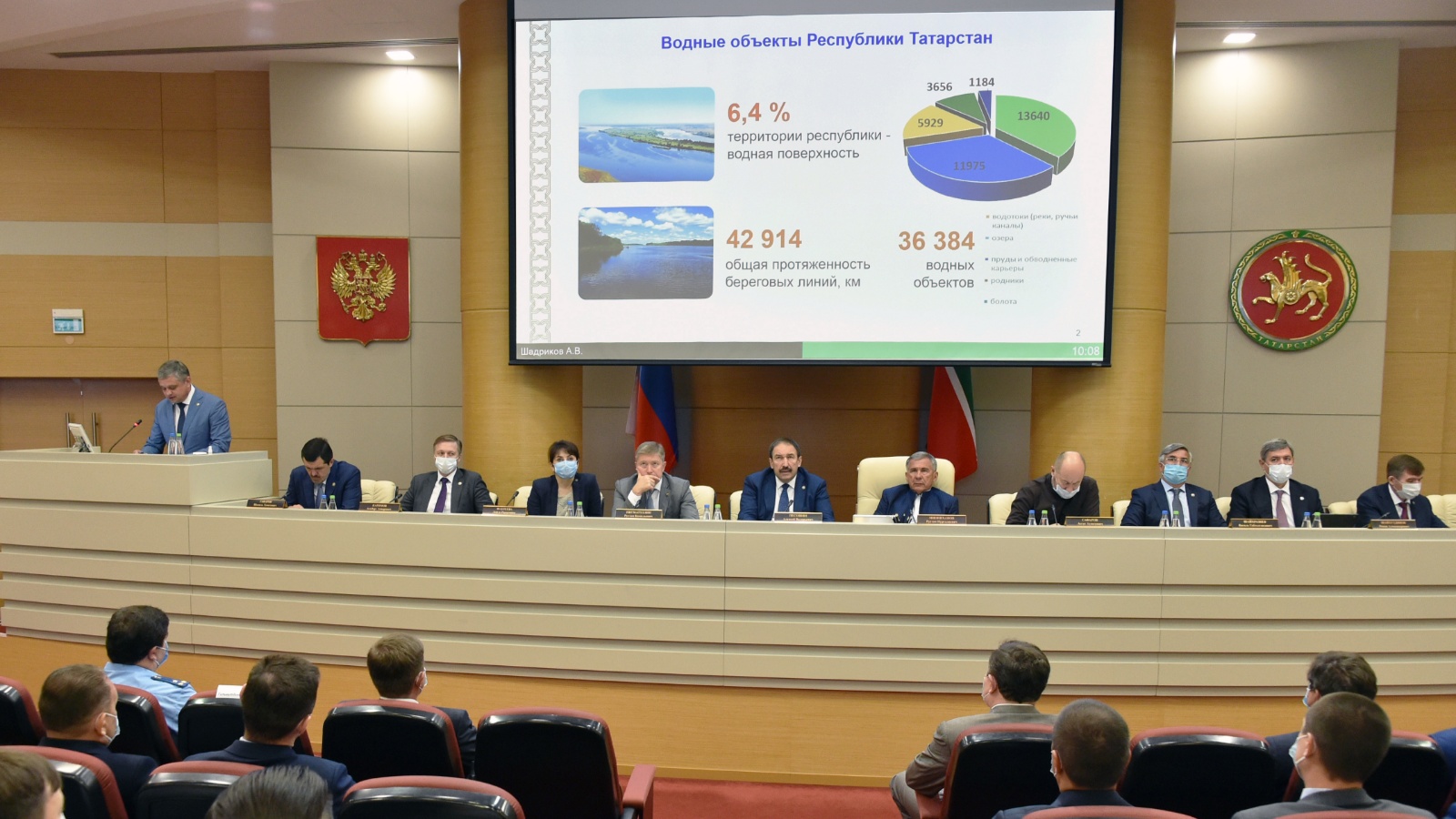The ecological state of small rivers was discussed at the meeting of the Cabinet of Ministers of the Republic of Tatarstan

A meeting of the Cabinet of Ministers of the Republic of Tatarstan was devoted to the issue of the ecological state of small rivers and reservoirs of the Republic of Tatarstan, according to the website of the Government of the Republic of Tatarstan.
The meeting was held in the Government House of the Republic of Tatarstan, with video conferencing of all municipal districts. The meeting was held by the Prime Minister of Tatarstan Alexey Pesoshin, and was attended by the President of the Republic of Tatarstan Rustam Minnikhanov.
As Alexey Pesoshin noted, opening the meeting, Tatarstan ranks first in the Privolzhsky Federal District in terms of the total area of water bodies located on its territory. There are more than 36 thousand water bodies in the republic, more than 6% of the entire territory is covered with water.
"Water resources of the republic are the most important energy source, transport resource and resource for ensuring the activities of all sectors of the economy. The problem of water pollution is an acute one in the republic today", Alexey Pesoshin said. "The results of the ongoing monitoring of the quality of natural waters show that more than 90% of the samples taken have exceeded the maximum permissible concentrations of pollutants."
The main report "On the ecological state of small rivers and reservoirs of the Republic of Tatarstan" was delivered by the Minister of Ecology and Natural Resources of the Republic of Tatarstan Alexander Shadrikov. He stressed that the problem of water pollution in Tatarstan is acute. There are 174 wastewater treatment plants operating in the republic. The monitoring results show that not all wastewater discharged into water bodies meets the established standards.
The Head of the Ministry of Ecology of the Republic of Tatarstan noted that one of the factors of pollution of water bodies is diffuse runoff. Surface storm runoff flows throughout the basin of water bodies from agricultural enterprises, the volume of which is more than half of the total volume of organized discharge. Livestock runoff has a particular negative impact on water bodies, as the high content of nitrogen, phosphorus, and sulfur in them leads to biological contamination. In order to exclude the sources of these effluents, it is necessary to prevent the placement of animal waste by agricultural enterprises in the territories adjacent to water bodies, as well as to cross the facts of plowing agricultural land in these territories. It is also necessary for each agricultural enterprise to organize specialized lagoons for manure conservation. An effective method of controlling diffuse runoff is to equip storm sewer outlets with treatment facilities, as well as to create water protection protective forest strips along the banks of water bodies.
Restricting citizens' free access to water bodies is another frequent violation. As a result of the above violations, water bodies are depleted and destroyed, environmental sustainability and normal functioning are reduced, and natural inflow from the catchment area is reduced, which negatively affects the flora and fauna.
Rustam Minnikhanov noted that today one of the main tasks is to reduce the impact of people, agriculture and industry on the environmental situation, to reduce the flow of polluted wastewater into rivers and reservoirs. "We have big plans for Kazan wastewater treatment plants and other facilities," said the President of Tatarstan.
Rustam Minnikhanov recalled that earlier the President of the Russian Federation Vladimir Putin gave instructions to control the situation in the field of ecology.
"We need to change our attitude to the protection of nature, to lakes and rivers," said Rustam Minnikhanov. - We live here, we use all these resources. All our municipal and national facilities should work perfectly. Within a maximum of five years, we must put all the treatment facilities in order. Where the owners of the objects do not cope – it is we need to punish them."
Rustam Minnikhanov urged to take care of the water resources of small rivers. He also suggested using scientific developments in the field of wastewater treatment. "We will form a program for treatment facilities, we need to work very seriously," the President of the Republic of Tatarstan said.